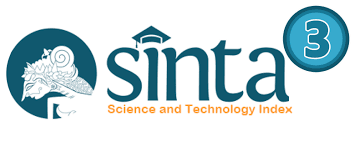Perspektif E-Learning Dosen Program Studi Sistem Infromasi UNIPMA
DOI:
https://doi.org/10.25273/research.v1i1.2448Abstract
Downloads
References
Setiawan dimas, Asnawi Noordin, dan Mumtahana Hani Atun, "Evaluasi Gaya Pembelajaran Dosen Program Studi Teknik Informatika UNIPMA Kaitannya Dalam Trend Pendidikan Berbasis Teknologi," in International Conference Seminar, Yogyakarta, 2017, p. 186.
Silahudin, "Penerapan E-LEARNING dalam Inovasi Pendidikan," CIRCUIT, vol. I, pp. 48-57, Juli 2015.
Mukminan, "Teknologi Pendidikan Untuk Peningkatan Kualitas Pembelajaran," in Seminar Nasional Teknologi Pendidikan, Pontianak, 2012, pp. 1-12.
Nugraha I Kadek Agus Erta, Agustini Ketut, and Sindu I Gede Partha, "Analisis Pemanfaatan E-Learning Sebagai Knowledge Management Dalam Mendukung Proses Pembelajaran Di Jurusan Pendidikan Teknik Informatika Undiksha," KARMAPATI, vol. VI, no. 1, 2017.
Indrawan Irjus, "Meningkatkan Mutu Pendidikan Melalui Metode E-Learning," Jurnal AL-AFKAR, vol. III, pp. 69-83, Oktober 2014.
Behera Santosh Kumar, "E- AND M-LEARNING: A COMPARATIVE STUDY," International Journal on New Trends in Education and Their Implications, vol. IV, no. 3, pp. 65-78, Juli 2013.
Downloads
Published
How to Cite
Issue
Section
License
Authors who publish with this journal agree to the following terms:Authors retain copyright and grant the journal right of first publication with the work simultaneously licensed under a Creative Commons Attribution License that allows others to share the work with an acknowledgement of the work's authorship and initial publication in this journal.
Authors are able to enter into separate, additional contractual arrangements for the non-exclusive distribution of the journal's published version of the work (e.g., post it to an institutional repository or publish it in a book), with an acknowledgement of its initial publication in this journal.
Authors are permitted and encouraged to post their work online (e.g., in institutional repositories or on their website) prior to and during the submission process, as it can lead to productive exchanges, as well as earlier and greater citation of published work (See The Effect of Open Access).






